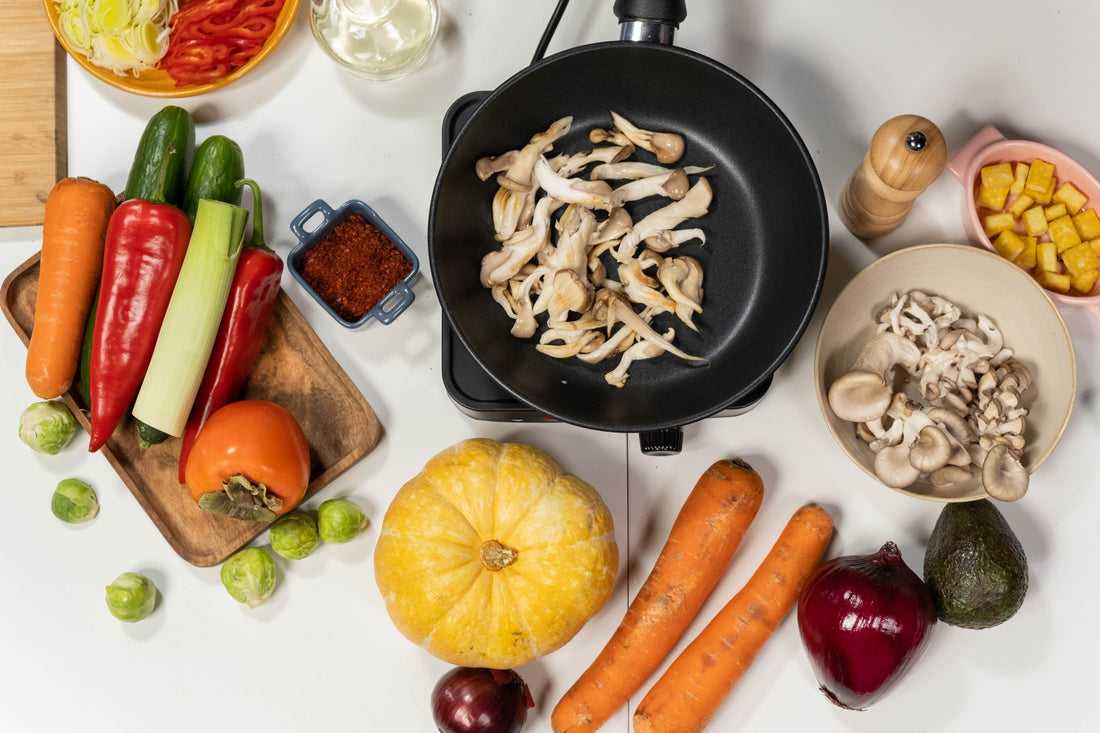
15 Low-Calorie Foods for Weight Loss | Why They Work
Share
Top 15 Low-Calorie Foods for Weight Loss | Why They Work
Hey there, health-conscious readers! Today, we're diving into the world of low-calorie foods and how they can be your secret weapon for successful weight loss. If you're looking to shed those extra pounds, stick around because we've got the top 15 low-calorie foods and the science behind why they work!

1: Cucumber
Let's kick things off with the humble cucumber. Cucumbers are over 95% water, making them incredibly hydrating. A whole cucumber contains only about 15 calories! The benefits? They keep you hydrated, help with digestion due to their fiber content, and provide essential vitamins and minerals like vitamin K and potassium. The high-water content also keeps you feeling full, reducing overall calorie intake.

2: Lettuce
Next on our list is lettuce. Leafy greens like lettuce are virtually calorie-free, making them perfect for salads and wraps. The benefit here is the abundance of fiber, vitamins A and K, and minerals like calcium and iron. These nutrients promote digestion, support bone health, and keep you satisfied without loading up on calories.

3: Celery
Celery is another classic low-calorie favorite. With only about 6 calories per stalk, it's an excellent choice for snacking. But what's interesting is that it takes more calories to digest celery than it provides, making it a negative-calorie food. The fiber keeps you feeling full, and it's loaded with vitamins A, K, and C, as well as antioxidants.

4: Zucchini
Zucchini, with its mild flavor and versatility, is a low-calorie superstar. A medium-sized zucchini contains just around 30 calories. These green wonders are high in fiber, vitamins A and C, and minerals like potassium and magnesium. They can be used in a variety of dishes as a healthy substitute for higher-calorie options.

5: Spinach
Spinach is a nutrient powerhouse. It's low in calories, high in fiber, and packed with vitamins A, C, and K, as well as folate. Plus, it contains iron and calcium, which support bone health. Including spinach in your diet can help improve bone health, aid in digestion, and contribute to overall well-being, all while contributing very few calories.

6: Broccoli
Broccoli, like other cruciferous veggies, is incredibly low in calories but rich in nutrients. It's high in fiber, vitamin C, vitamin K, and folate. Plus, it contains compounds like sulforaphane, which may support detoxification and reduce inflammation. Adding broccoli to your meals can help fill you up while keeping the calorie count down.

7: Cabbage
Cabbage, whether in coleslaw or stir-fry, is a fantastic low-calorie option. It's high in vitamins C and K, as well as fiber and antioxidants. Cabbage also contains compounds that may promote gut health. With roughly 22 calories per cup, it's a weight loss-friendly food that offers numerous health benefits.

8: Tomato
Tomatoes are a low-calorie fruit (yes, fruit!) that's rich in vitamins, especially vitamin C and potassium. They're also loaded with antioxidants like lycopene, which may help reduce the risk of chronic diseases. Incorporating tomatoes into your diet can add flavor and nutrition without adding many calories. Plus, the fiber in tomatoes aids digestion and keeps you feeling satisfied.

9: Mushrooms
Mushrooms are an excellent meat substitute for vegetarians and vegans. They're low in calories but provide a satisfying umami flavor. They're also a source of vitamins D and B, selenium, and antioxidants. These nutrients support immune health, while the low-calorie content makes mushrooms a great addition to any weight loss plan.

10: Cauliflower
Cauliflower is a versatile low-calorie vegetable. With only about 25 calories per cup, it's a great option for weight loss. It's also a good source of fiber, vitamin C, and vitamin K. Cauliflower can be transformed into various dishes, from cauliflower rice to cauliflower pizza crust, providing a healthy alternative to calorie-dense options.

11: Green Bell Peppers
Green bell peppers, while slightly higher in calories than some other veggies on our list, are still relatively low in calories. They're rich in vitamins A and C, fiber, and antioxidants. These nutrients support eye health, boost immunity, and add a satisfying crunch to your meals.

12: Asparagus
Asparagus is known for its low-calorie content and is high in fiber. A cup of asparagus contains only about 20 calories. It's also packed with vitamins A, C, and K, as well as folate and antioxidants. Asparagus can help with digestion and may even reduce the risk of certain chronic diseases.

13: Radishes
Radishes are crunchy, spicy, and incredibly low in calories. They're a good source of vitamin C, potassium, and antioxidants. The high-water content in radishes helps with hydration, and their fiber content supports digestive health. Enjoy them as a snack or in salads for a refreshing crunch.

14: Watermelon
Watermelon is a refreshing fruit with a high-water content, which can help keep you hydrated and feeling full. A cup of watermelon contains around 46 calories, making it a guilt-free sweet treat. It's also a source of vitamins A and C, as well as antioxidants like lycopene, which may support heart health.

